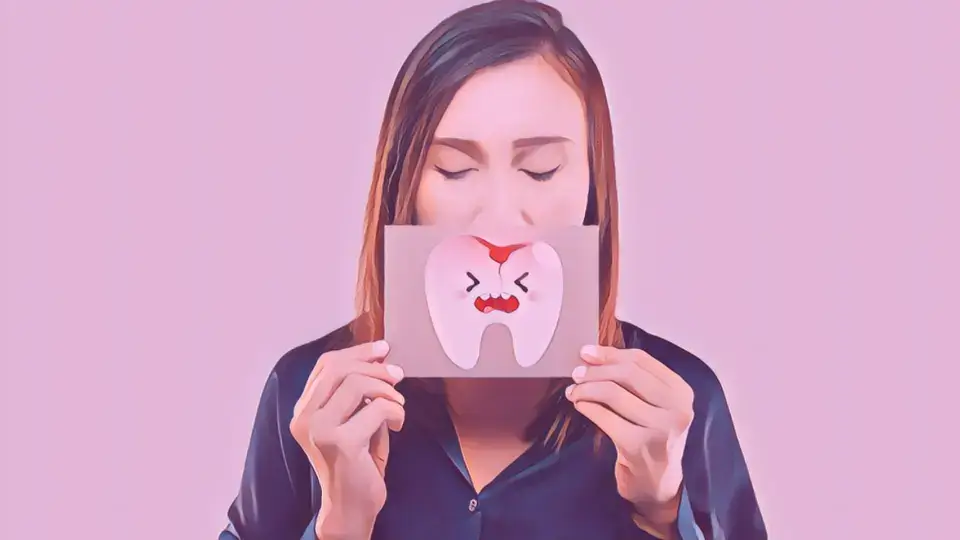Sensitive teeth
You're not alone if you suffer from sensitive teeth.
Tooth sensitivity can manifest itself in many ways, from pain when cold or hot, to discomfort when eating sweet or acidic foods.
You may experience sensitivity in a single tooth, or it may affect several teeth. Regardless of the severity, it’s essential to understand the causes of tooth sensitivity and learn that you’re not helpless in the face of this problem.
Your dental hygienist can save you from this pain. Don’t hesitate to make an appointment for a free dental consultation!

3 types of tooth sensitivity
Tooth sensitivity can take many forms, each with its own causes. Here are three common types of tooth sensitivity
Cold and heat sensitivity
Cold/hot sensitivity is one of the most common problems. It occurs when the dentin, the layer beneath the enamel, is exposed. The causes of this sensitivity can be caries, root canal disease or excessive enamel wear.
Sensitivity to Touch
Sensitivity to touch often occurs when brushing teeth. Underlying causes may include a toothbrush that's too hard, excessive pressure when brushing, or teeth that are sensitive to wear.
Sugar Sensitivity
Sugar sensitivity can result from caries, exposed dentine or general sensitivity.
Sensitive teeth
causes and remedies
Dental Enamel Erosion
Causes:
Erosion of tooth enamel due to poor oral hygiene, a hard toothbrush, or excessive use of bleaching agents can expose the underlying dentin.
Solutions:
Use special toothpastes for tooth enamel, avoid acidic foods, and consult a dentist for protective treatments.
Dental Cavities
Causes:
Cavities, the result of acid attack by bacteria, can cause holes in tooth enamel and sensitize teeth.
Solution:
Treatment of cavities by a dentist is essential, following good oral hygiene and reducing sugar consumption can help prevent cavities.
Devitalized Teeth
Causes:
Following root canal treatment, teeth can become sensitive to heat and cold.
Solution:
Filling or crown treatments by a dentist are necessary, and you can use desensitizing toothpastes.
Retracted gums
Causes:
Retracted gums expose dentin, which can be caused by poor brushing technique or gum problems.
Solution:
Schedule an appointment with a dental hygienist for dental scaling or periodontal treatment, improve your brushing technique, and use a soft toothbrush.
Aggressive brushing
Causes:
Using a hard toothbrush and brushing vigorously can erode tooth enamel, causing sensitivity.
Solution:
Use a soft toothbrush, brush carefully, and avoid brushing too vigorously.
Sugar Sensitive Teeth
Causes:
Excessive sugar consumption promotes the growth of bacteria in the mouth, leading to dental problems.
Solution:
Limit sugar consumption and practice rigorous oral hygiene.
Nutritional factors
Causes:
Acidic foods and drinks, such as citrus fruits and soft drinks, can erode tooth enamel.
Solution:
Avoid or reduce consumption of acidic foods and beverages, and rinse your mouth with water after eating them.
Dental trauma
Causes:
A dental injury, such as a fracture, can expose dentin and cause sensitivity.
Solution:
Consult a dentist to assess the extent of damage and consider treatment options, such as veneering.
Have you experienced tooth sensitivity during teeth whitening or scaling ? Are you afraid this might happen to you ?
Many of our patients are concerned that teeth whitening will cause tooth sensitivity and ask us if teeth whitening is painful.
As a dental clinic specialized in teeth whitening, Whitening Artists has performed a large number of dental whitening procedures and cases of sensitive teeth have been very rare.
If you’re worried, don’t worry. We offer a tooth desensitization treatment a few weeks before whitening or scaling.

